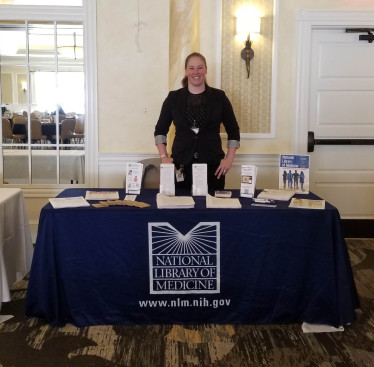Nov
19

Posted by NNLM Region 7 on November 19th, 2019
Posted in: Commentary, NLM Resources, Patient Engagement, Public Health
Tags: exhibit, NLM, resources, substance use disorder
This is conference session for my job at the National Network of Libraries of Medicine, New England Region. That means I get to attend lots of different conferences and meet and connect with a lot of different people. I was at NAHSL last week, and then I attended the symposium, Communities in Crisis: Libraries Respond to the Opioid Epidemic.
The Communities in Crisis: Libraries Respond to the Opioid Epidemic symposium is aimed at librarians and how they respond to Substance Use Disorder. This is an unfortunate necessity. Mainly public librarians, but other libraries as well, are having to address substance use in their communities and in the library. Patrons, coworkers, their own families – almost everyone has been exposed to or had to deal with someone affected by Substance Use Disorder. There are well over 100 people here at this symposium today, which is enough of a testament to how important this topic is.
From the OCLC’s report Public Libraries Respond to the Opioid Crisis with Their Communities, “The United States is experiencing an opioid epidemic, and public libraries across the country are choosing to respond to this public health emergency locally. As central community institutions open to all, public libraries are finding themselves on the front lines of the opioid crisis. Together with community partners, public libraries are providing critically needed information and services, organizing education and training events, and supporting prevention and recovery efforts.”
(Side note on language; the proper terminology is Substance Use Disorder (SUD). Not, drug abuse, or substance misuse, addict, etc. SUD is less stigmatizing and acknowledges that it is a chronic medical condition, rather than a moral failing. Also, while there is a huge focus on the opioid crisis right now, there are many other substances and issues that people may be dealing with.)
I truly wish this was not a topic that libraries had to address. But they do, and libraries are in an important position in the community. My job while attending the symposium is to help librarians have the information tools and resources for their own edification and to share with patrons. I think that given the controversy and misinformation that often surrounds SUD, it is more important than ever to make sure people are getting good, reliable, vetted information. Here are a few of the resources I am promoting:
However, while this symposium is a great opportunity to share information, more significantly, it is an opportunity for so many people come together and support each other. Like I said, there are well over 100 people at the symposium. They are all learning about and starting to break down the stigma surrounding SUD. Unfortunately, people may have to deal with SUD in their work or in their lives, but they now have a whole community to connect with. Librarians love their communities, their patrons, and other librarians. They love to be able to help to make all these groups better. A librarian is not going to be able to solve all the problems facing SUD in libraries, but in some small way librarians can address Substance Use Disorder.

A version of this was originally posted on NNLM NER Associate Director Martha Meacham’s blog, here.